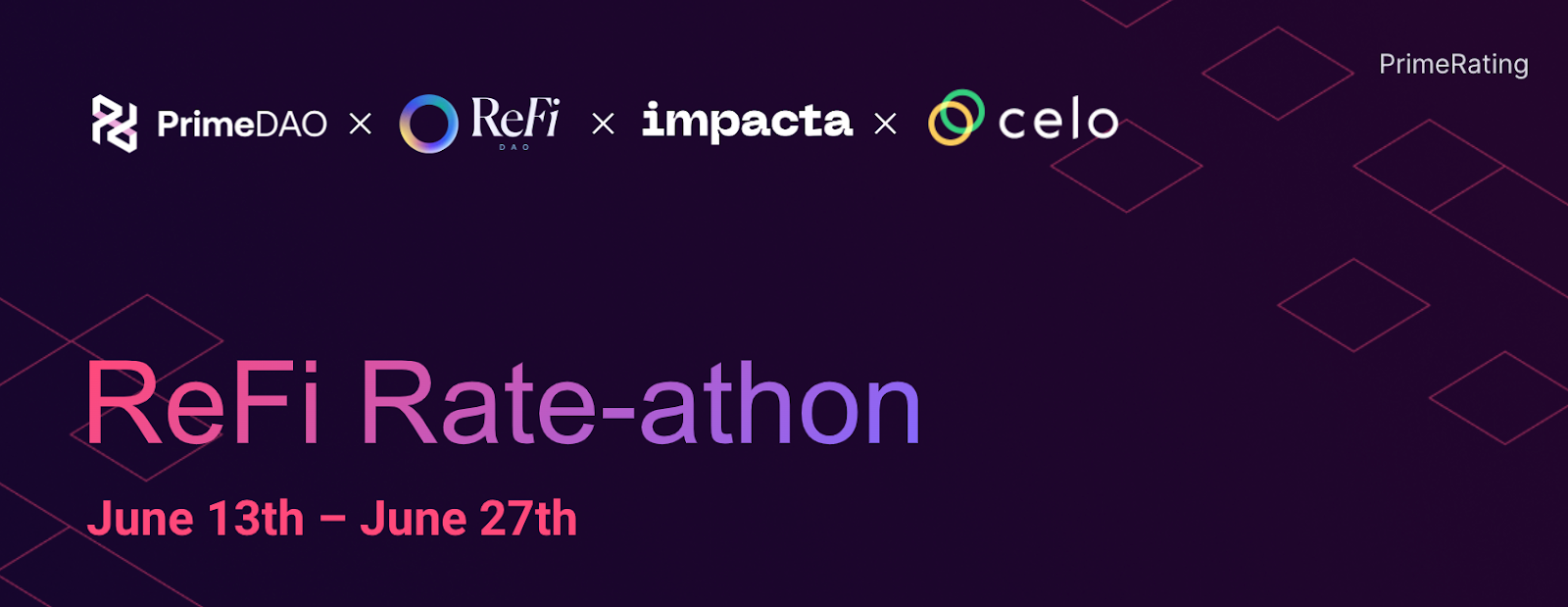ReFi Rate-athon is Underway!

ReFi DAO is halfway through the ReFi Rate-athon, a partnership with Prime DAO and Impacta Finance to help build trust in the ReFi space and encourage capital to flow to high-integrity projects.
By creating an open framework for evaluation and rewarding researchers for their analysis—we hope to help curate a list of verified ReFi projects so that founders, talent and investors can make sense of where to invest their time, energy and capital.
How do we grow a movement with integrity and impact?
Despite the massive potential for leveraging web3 tools to coordinate meaningful climate impact at scale, there are a number of high level challenges we face in the ReFi space:
- Most people mistakenly believe crypto is bad for the planet and therefore don’t engage
- Bad actors have degraded trust; the recent collapse of Terra is one of several costly failed experiments that impacts the perception of the space
- We don’t have enough data on meaningful and impactful use cases for web3 despite the amount of capital flowing into the system
- Regulators don’t understand the power of Web3 to address the most pressing challenges of our time
- Due to regulatory uncertainty, many actors adopt a pseudo anonymous identity which exacerbates the issue of distrust
Who watches the watchers?
With the latest crash seeing crypto plunge over 50% from $3.1 trillion to less than $1.3 trillion (as of writing on the 16th June 2022) we’ve seen life savings decimated and many projects die. On the one hand this is a part of a rapidly emerging space beginning to mature as we go through market cycles, but on the other it fuels the call for tougher regulation from traditional finance and governments who would rather see punitive policies that inhibit innovation.
Web3 actors have been asking for regulatory clarity and much is needed, but how far will governments go to restrict the sandbox of experimentation in the space? How can we ensure there are fewer Terra's and Klima's and more high-impact applications of blockchain solving real-world problems?
Given the severity and urgency of the climate crisis and ecosystem collapse, we need to be laser-focused on using this powerful technology to solve real problems. We need to courageously call out bad actors and encourage everyone to build ventures with impact, integrity and inclusion at its core.
“We’re seeing a very nice parity with a lot of protocols emerging, so we feel it is important to see the protocols from within and evaluate them in a transparent and distributed way.” — Paula Palermo from Impacta Finance
This speaks to web3’s characteristics of decentralisation, openness, 'trustlessness',that would allow the ReFi movement to self-regulate.
The big picture
The first ReFi rating event of Prime Rating went live on June 13th and will finish on June 27th. During this period, ReFi Researchers will create reports on the leading and upcoming ReFi projects. It's working towards a crowdsourced evaluation framework and open database to incentivize actors to use the power of web3 for planet positive impact.
This is a part of Prime DAO’s collaboration with Celo called the "ReFi Launch Program" that provides up-and-coming ReFi protocols with pre-purchasing and liquidity. Being able to identify the most promising up and coming actors seems to be a great move by Prime DAO to protect the deployment of capital via the ReFi Launch program.
During the ReFi Rate-athon, a handful of analysts will evaluate the integrity of a number of ReFi projects with the aim to create a baseline understanding and comparison. From this baseline, raters will be able to share their learnings and help ReFi protocols improve.
As anyone in the impact space knows, it's really hard to objectively define and measure impact. Given the subjective nature, it's important that we get started while recognising the need for intellectual humility and transparency. The evaluation framework created by Prime DAO and Impacta leverages their joint experience across the DeFi, Metaverse and impact investing space and acts as a launch pad for improvement based on feedback from experts, evaluators and the projects themselves.
Becoming JEDI!
We hope to also build on the existing frameworks that have been developed over many years, such as the J.E.D.I. Toolkit. JEDI stands for Justice, Equity, Diversity and Inclusion. This toolkit has been designed to encourage allocators, investment influencers and intermediaries across the spectrum to understand the dimensions of JEDI investing, and start applying gender and JEDI lenses throughout their investment processes and strategies.
Or the well established IMP - The "Impact Management Project" which began in 2016 as a time-bound forum for building global consensus on how to measure, assess and report impacts on people and the natural environment.
Learning from elsewhere
We’ve also seen the B Corp successfully implement a global accreditation program for Benefit Corps that increasingly pushes them to be more impactful and makes it easier for consumers to identify impactful businesses. In ReFi, we see various projects looking to use technology to measure, report and verify carbon projects.
Regen Network and Open Forest Protocol’s validators have a specific role to carry out due diligence on carbon projects; looking at information provided by a project, the validators have to stake their tokens on how accurate they believe the information to be without seeing what other validators are staking too. In this manner "truth can be coordinated more easily than falsehood" as the fiscal responsibility of the stakers to carry out due diligence is motivated by the financial incentives designed by the system.
You can read more in our Deep Dive on Open Forest Protocol here.
Has this been done before?
Yes, but specifically more around financial and blockchain due diligence rather than impact. Prime DAO have been creating open models and rating events to evaluate DeFi and Metaverse projects. They created a framework for quantifying the quality and risk of open finance protocols as a public good for DeFi market. A similar approach is now being adapted for the impact aspirations of ReFi protocols.
Why does it matter?
Increasing trust
One of the most important factors that investors look at is the level of associated risk in any investment. Due diligence goes as deep as it can to find information on what is actually happening within an organisation. When information isn’t available or the data shows red flags, then the associated risk is too high and the investor will likely not invest. Conversely, if there is transparency and the operations can be analysed, then risk goes down, trust in that organisation is increased, and investors are more likely to invest as long as there are no red flags.
Resiliency
Having our own protocols subject to different levels of scrutiny also helps founders see blind spots. This is vital at early stages when we could find ourselves in an echo chamber or otherwise blinkered by our own biases. With a different lens on the challenges we are trying to solve, we can adapt, remove red flags, and build more resilient organisations.
Increasing collaboration opportunities
With an open database that goes into depth on the activities of a protocol, we increase the chances that another partner can find the missing elements they need to get their own project off the ground - or to increase their impact through for example a greater outreach.
Efficiencies
As Luuk Weber from PrimeDAO commented “For me, that’s the really most exciting part, opening up the collaboration space”. By having an open collaboration space gives us economies of scale; it speeds up the time it would take for any collaborator to do the due diligence on a potential partner. Imagine you have two protocols debating whether they should or shouldn’t collaborate. If a third party has done the due diligence on both, and it’s been corroborated by multiple peers then the time it takes for these two protocols to make a decision is dramatically shortened. For every hour the raters put in means the next partner has less work to do as they access that data.
Save money
Security audits are expensive! And many protocols have failed as a result of shoddy tokenomics and not paying for a good auditor to run a solid testing process. By crowdsourcing accreditation we can perhaps lower the costs of regulation so more protocols can access the service. This avoids traditional bottlenecks that we see in centralised traditional financial markets when only a small group of auditors are available to carry out due-diligence.
Win-win
It also reduces the chances of redundancy. One thing that Daryl Edwards has learnt through the ReFi DAO founders circles has been “seeing how founders find the tech they need that other founders have already made. When we build on each other’s work, we see the whole sector level up consistently in win-win scenarios rather than trying to compete against each other.”
Incentivising Impact
Rather than punishing companies for the things they do or don’t do, ReFi Ratings hope to reward and incentivise better behaviour. It’s hard to implement justice, equity, diversity and inclusion (JEDI) in our orgs, but with the right incentives to encourage founders to do this perhaps we can really be a driving force for fighting social injustice around the globe.
'GEFNSETT'
There is a good sense-check concept in Sociocracy; do you all feel this is “Good Enough for Now and Safe Enough to Try?" We realize that our first version won't be perfect, but it will be a starting point for feedback and improvement. The first Rate-athon is about getting on the right trajectory - it’s not about determining whose standards for measuring carbon are better than others, but to cover just the basics for each organization. The methodologies will be designed over two-week sprints. Some methodologies will be measurable from the outset. But Luuk’s main hope is to see who is navigating in the right direction for a ReFi vision, and over time, we’ll see some evolutions to build granularity in our methodologies.
Currently the Prime Rating methodology carries out a two part process:
- Fundamental Review: The Fundamental Analysis evaluates the overall quality of a project based on its Value Proposition, Tokenomics, Team, Governance, and Regulatory qualities.
- Technical Review: Essentially a security audit, created in collaboration with DeFi Safety, the Technical quality Review evaluates the technical quality of a project based on its Code, Documentation, Testing, Security and Access Controls.
Open Questions:
The methodology opens up many interesting questions for founders, investors and for raters. For example would you feel comfortable revealing data on your ReFi protocol if you were asked to share:
- Founder profiles and names for public accountability
- Upload collateral (white paper etc, for review)
- Open books (access to finances for review,
- Cap Table (Founder token holdings)
- Open source code for security auditing
- Increasing breadth and depth of regenerative practises
From an investor’s perspective, if you knew that a protocol had openly shared and been rated on all of the above and more, would you be more likely to invest in it? We’re delighted to have that conversation in the ReFi DAO telegram channel and we are already finding that founders of ReFi projects are electing to make publicly available their data for evaluation.
Get involved
The benefits of joining as a Rater are you earn cUSD for each Report accepted. You gain experience and get a chance network in the ReFi space. You also get the chance to become part of one of the friendliest and most engaging research DAOs in web3!
As ReFI DAO, we've been very grateful to meet the incredible team at Prime DAO and have the chance to support them in this amazing opportunity.
Become a rater and earn!
If you're an expert in either Web3 or Impact / Regeneration evaluation, then we need you for the final week! If you have some experience researching Web 3.0 projects and some affinity with Impact / Regeneration, you’re still in good shape. If you’re not as experienced in one of the two fields, you can still participate, however, we would suggest you try to team up with someone else who is more experienced in the part that’s new to you! You can use the #ReFi-Rating discord channel in PrimeDAO’s discord to find partners and invite people you know to the space.
And to become a ReFi Rater, you can 📝 Apply here! We can't wait to get the ball rolling and we thank you for your enthusiasm and participation. Finally, Luuk from Prime DAO has written up a fact sheet on Kickstarting the ReFi Rate-athon which has many more details for you to get involved.

